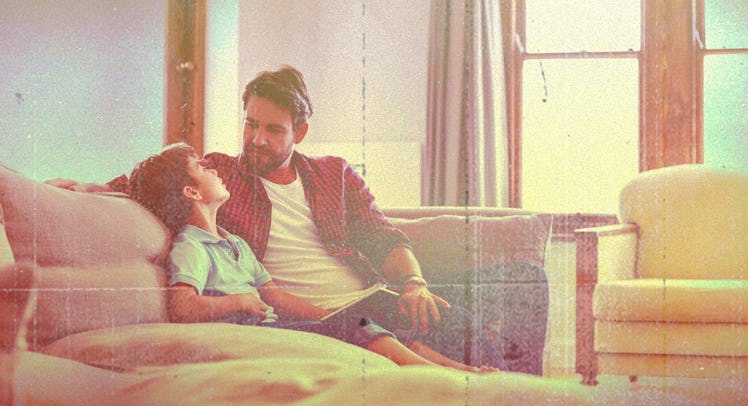What I Told My Toddler After My Grandfather Died
Sometimes, it's best to be straightforward.

A few weeks ago, my grandfather passed away. He was 92. He lived a long and storied life and was the epitome of the word “patriarch.” He had six grandsons and four great-grandchildren, all of whom knew they were the most important things in his life. When it came time for the funeral, I was poised with a tough decision. My wife had an international business trip she couldn’t get out of so, I had to decide if I should keep my kids home in Nashville with my in-laws or fly them back to my hometown of Philadelphia to go to the funeral.
If it wasn’t my grandfather, I might have let the kids stay in Nashville. But this wasn’t just anyone: my grandfather has impacted multiple generations of my family. I felt there was an obligation and a duty to make sure that my grandfather, who we called Pop-pop, had each of his three generations of family members represented. But that posed a challenge.
My wife questioned my decision, in practical terms. I had flown alone with my 4-year-old and nearly 2-year-old before, but not under this emotional weight, and even then, it was tough. Without her there for my own emotional support or our kid’s parental support, this was a heavy burden but I knew what I was up against. My wife also knew that I was going to have to have a real conversation with our kids — one we hadn’t had yet. “You know you’re going to need to talk to Fox about this,” she said. “You should do it before you leave.”
Our son is very emotional. Since this is a trait he takes after me, I felt I had the emotional fortitude to handle this conversation. He had seen one (or maybe a few) of his pet fish die but beyond that, he didn’t understand it. The idea that a person, someone he knew by name, could die had not been something he had to face.
The morning we were set to fly, my son bounced out of bed early. He ate his breakfast and talked about going to “Phillydelphia” and seeing my parents, his Grammy and Grampy. It was just the two of us. This was my moment to talk to him.
I had done a little bit of research on how to talk to kids about death. I wasn’t coming in loose, but I was afraid there’d be a curve-ball question that only a toddler could ask. We aren’t raising our kids in a specified religion so I couldn’t lean on the traditional “heaven” concept.
So, I decided to be blunt. I told him as matter of fact as I could that Pop-pop had died. It was hard for me to say those words and I understood why so many use terms like ‘passed away’ or ‘gone to a better place’. But I’m glad I didn’t say them to Fox. It just didn’t seem right. He needed to understand death in its finality.
He asked what that meant.
“Well, Pop-pop had lived a very long life and his body was tired and wasn’t able to work anymore.”
Fox then began to ask some of the standard questions of the curious: “Is he coming back?”, “Will his body work again?”
Every time I had to tell him “no”, I felt weight hit my throat. As I spoke, the realization that my grandfather had died was hitting me, too. I held back tears. I wanted to appear calm and understanding, to show my son death is natural.
And by being so honest with him, I found that I was starting to cope a little bit, too. The blunt language used when dealing in toddler-speak helped me handle my own emotions. I couldn’t hide behind euphemisms or let myself be in denial. I told him that he was going to see a lot of sad people, people who were sad that they wouldn’t get to see Pop-pop again. But they would want to talk about him because that’s how they share how special he was.
Then came the odd questions. “Are we dead?” and “When will you die?” Toddler philosophy at its finest. After shaking off initial shock of such questions, I answered, “no” and “I don’t know, but hopefully not for a long time” and he took them in stride. He’d repeat some of the same questions throughout the morning, trying to comprehend what I was telling him. He never got upset or scared. He was just trying to understand it all.
My parents and I decided it would be best for the kids to not come to the funeral. My grandfather was a large figure in his community and the length of the viewing and the funeral service was going to be too long for them to sit patiently through. They came to the reception, however, where they became a bright spot to a lot of family and friends in attendance. As I looked at my son talking to the older folks at the reception, bouncing around the room and listening to stories, I saw family in full circle. I saw my grandfather in all of this.
The next day, before we left for the airport, I overheard Fox talking to my dad.
“Grampy, you know Pop-pop’s dead,” he said, “but I am glad you’re here.”
Another little nugget of philosophy. My son saw the meaning of it all. Death happens, he knew, but what you’ve got right in front of you is what matters most.
This article was originally published on